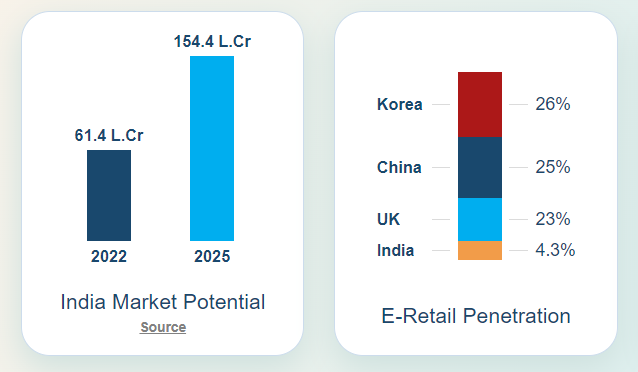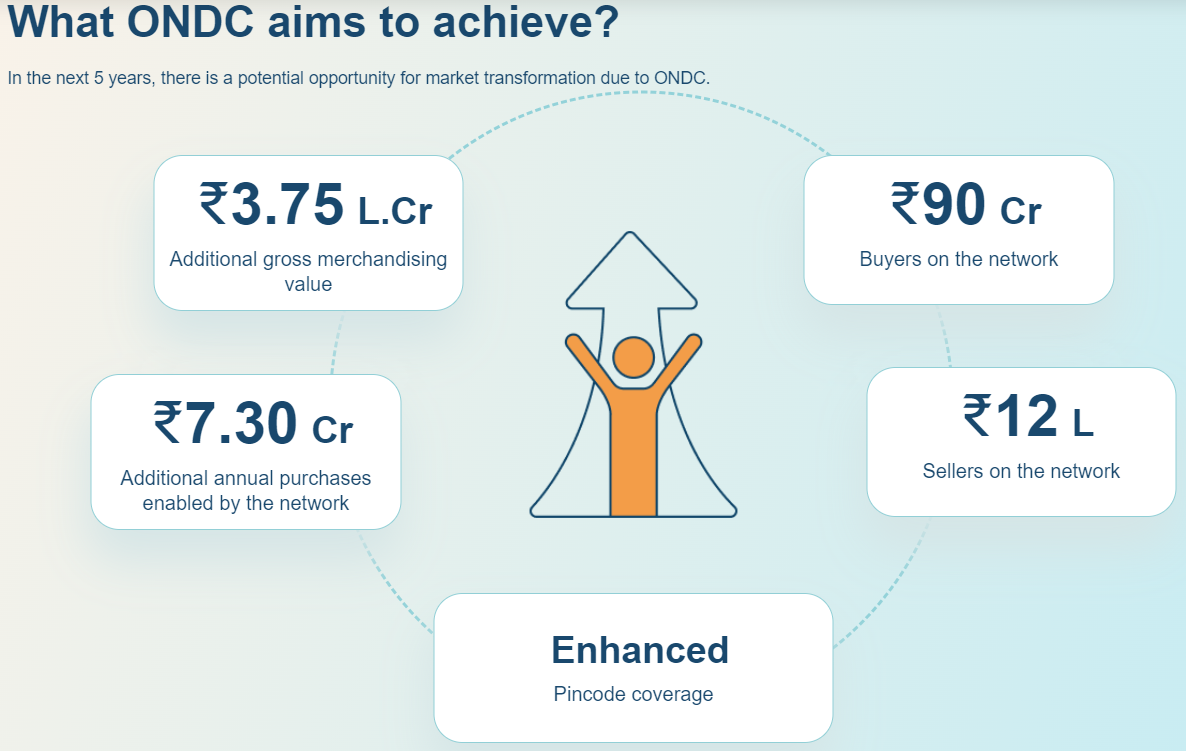Open Network for Digital Commerce (ONDC)
2023 MAY 24
Mains >
Science and Technology > National institutions & initiatives > e-Commerce
IN NEWS:
- The “ONDC Elevate” program was recently held at Bengaluru to commemorate ONDC's one-year completion
- ONDC network has begun to gain popularity recently. As per reports, the network has surpassed the 10,000 daily order mark.
CURRENT E-COMMERCE LANDSCAPE:
- India has the third largest online shopper base behind USA and China. However, e-retail penetration in India is only 4.3%.

- Current e-commerce sector is dominated by platforms like Amazon. However, the platform-centric nature presents numerous obstacles in making e-commerce accessible to the larger population. These include:
- A single entity has full control in managing all operations in the e-commerce value chain.
- Sellers face challenges including high margin costs and the need to maintain a presence on multiple platforms.
- Buyers and sellers can transact only if they are part of the same platform.
- The rise of monopolies
- Greater access to data provides a greater digital capital to a corporation, granting it an advantage over its competitors
- More than 12 million sellers earn their livelihood by selling or reselling products and services. However, only 15,000 of these sellers (0.125% of the total) have enabled e-commerce.
OPEN NETWORK FOR DIGITAL COMMERCE (ONDC):
- ONDC is an initiative aimed at promoting open networks for all aspects of exchange of goods and services over digital or electronic networks.
- ONDC is initiated by the Department for Promotion of Industry and Internal Trade (DPIIT), Ministry of Commerce and Industry.
- ONDC aims at promoting open networks developed on open-sourced methodology, using open specifications and open network protocols independent of any specific platform.
- ONDC is expected to digitise the entire value chain, standardise operations, promote inclusion of suppliers, derive efficiencies in logistics, and enhance value for consumers.
- ONDC is backed by the government and has been set up to democratise the country's digital commerce space.
- ONDC is not a separate app. Instead, ONDC works like UPI, which means it can be added to existing apps like Paytm and PhonePe.
- From the launch of beta testing on September 29, 2022, ONDC has scaled to 36,000 sellers, 45+ Network participants and 8+ categories, with a weekly average of 13,000+ retail orders and 36,000+ mobility rides per day with peak transactions reaching 25,000 retail orders on a day.

|
What is Open- Source project?
- An open-source project means that anybody is free to use, study, modify and distribute the project for any purpose.
- These permissions are enforced through an open-source license easing adoption and facilitating collaboration.
- ONDC is creating a platform that can be utilized by all online retailers which is an open network protocols- independent of any specific platform.
- Onboarding of sellers, vendor discovery, price discovery and product cataloguing could be made open source on the lines of Unified Payments Interface (UPI).
|
SIGNIFICANCE OF ONDC:
- Expand the e-commerce landscape:
- ONDC recognises the opportunity to increase e?retail penetration from the existing 4.3% to its maximum potential in India.
- Overcome platform-centric challenges:
- ONDC protocols would standardize operations like cataloguing, inventory management, order management and order fulfilment. Thus, small businesses would be able to use any ONDC compatible applications instead of being governed by specific platform centric policies.
- Enhance business efficiencies:
- ONDC can reduce the cost of doing business in India by reducing various cost overheads such as acquisition costs, digital presence costs, and inventory costs across all businesses.
- Enhance customer choice:
- Consumers can potentially discover any seller, product or service by using any compatible application or platform, thus increasing their freedom of choice.
- Make e-Commerce more inclusive and accessible:
- E?retail has been out of reach for majority of sellers, especially from rural areas. ONDC ensures that all businesses, regardless of their size, location, or digital proficiency, can easily participate in digital commerce.
- ONDC will provide multiple options to small businesses to be discoverable over network and conduct business. It would also encourage easy adoption of digital means by those currently not on digital commerce networks.
- Providers and consumers would be able to use any compatible application of their choice for exchange of information and carrying out transactions over ONDC.
- Promote Indian products:
- ONDC will promote the inclusion of local suppliers and enable increased trade of locally manufactured goods, thereby multiplying investment and production of MSMEs.
- Formalisation of businesses:
- ONDC enables firms to formalise their businesses by creating active digital history and enable easier access to finance options.
- Economic development and livelihood creation
- ONDC will lead to the creation of opportunities across the digital commerce value chain including, logistics, packaging, last-mile delivery, and other areas.
- By facilitating scalable and cost-effective e-commerce through the open protocol, ONDC will empower startups to grow collaboratively.
CHALLENGES:
- Inter-disciplinary nature of e-commerce:
- Given the inter-disciplinary nature of e-commerce, the tackling of specific issues that emerge may be the subject matter of different statutes the Information Technology Act and Rules, the Competition Act, the Consumer Protection Act etc.
- Lack of a separate legislation:
- Definite legislations to manage e-commerce transactions are still to be framed, leading to lack of regulation of the sector.
- Enforcing IPR:
- Protecting intellectual property rights (IPR) and preventing distribution of pirated content through e-commerce is a growing concern.
- Unfair trade practices:
- Predatory pricing as a short-term strategy, adopted by some of the market giants, can undermine competition.
- Other unfair practices such as fake reviews can affect customer’s trust on the platform.
- Vulnerable to cyber-crimes:
- Engaging in e-commerce increases the chance of fraudulent financial transactions and loss of sensitive financial information.
PRACTICE QUESTION:
Q. What is Open Network for Digital Commerce (ONDC). How does it democratise the existing ecommerce ecosystem of the country?

